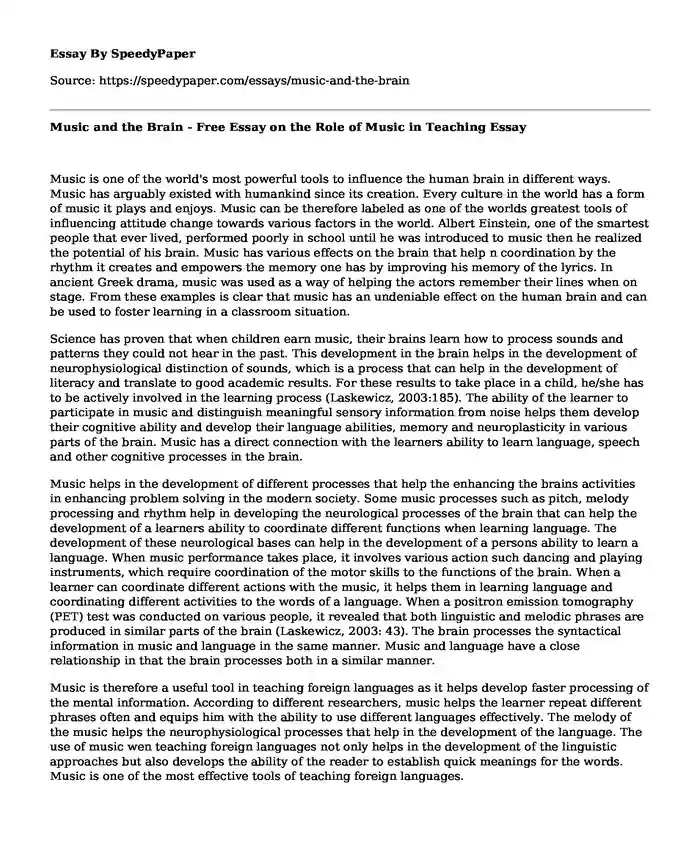Music is one of the world's most powerful tools to influence the human brain in different ways. Music has arguably existed with humankind since its creation. Every culture in the world has a form of music it plays and enjoys. Music can be therefore labeled as one of the worlds greatest tools of influencing attitude change towards various factors in the world. Albert Einstein, one of the smartest people that ever lived, performed poorly in school until he was introduced to music then he realized the potential of his brain. Music has various effects on the brain that help n coordination by the rhythm it creates and empowers the memory one has by improving his memory of the lyrics. In ancient Greek drama, music was used as a way of helping the actors remember their lines when on stage. From these examples is clear that music has an undeniable effect on the human brain and can be used to foster learning in a classroom situation.
Science has proven that when children earn music, their brains learn how to process sounds and patterns they could not hear in the past. This development in the brain helps in the development of neurophysiological distinction of sounds, which is a process that can help in the development of literacy and translate to good academic results. For these results to take place in a child, he/she has to be actively involved in the learning process (Laskewicz, 2003:185). The ability of the learner to participate in music and distinguish meaningful sensory information from noise helps them develop their cognitive ability and develop their language abilities, memory and neuroplasticity in various parts of the brain. Music has a direct connection with the learners ability to learn language, speech and other cognitive processes in the brain.
Music helps in the development of different processes that help the enhancing the brains activities in enhancing problem solving in the modern society. Some music processes such as pitch, melody processing and rhythm help in developing the neurological processes of the brain that can help the development of a learners ability to coordinate different functions when learning language. The development of these neurological bases can help in the development of a persons ability to learn a language. When music performance takes place, it involves various action such dancing and playing instruments, which require coordination of the motor skills to the functions of the brain. When a learner can coordinate different actions with the music, it helps them in learning language and coordinating different activities to the words of a language. When a positron emission tomography (PET) test was conducted on various people, it revealed that both linguistic and melodic phrases are produced in similar parts of the brain (Laskewicz, 2003: 43). The brain processes the syntactical information in music and language in the same manner. Music and language have a close relationship in that the brain processes both in a similar manner.
Music is therefore a useful tool in teaching foreign languages as it helps develop faster processing of the mental information. According to different researchers, music helps the learner repeat different phrases often and equips him with the ability to use different languages effectively. The melody of the music helps the neurophysiological processes that help in the development of the language. The use of music wen teaching foreign languages not only helps in the development of the linguistic approaches but also develops the ability of the reader to establish quick meanings for the words. Music is one of the most effective tools of teaching foreign languages.
Reference
Laskewicz, Z. (2003). Music as episteme, text, sign & tool: Comparative approaches to musicality as performance. Seattle, WA: Saru.
Cite this page
Music and the Brain - Free Essay on the Role of Music in Teaching. (2019, May 29). Retrieved from https://speedypaper.net/essays/music-and-the-brain
Request Removal
If you are the original author of this essay and no longer wish to have it published on the SpeedyPaper website, please click below to request its removal:
- Should U.S Weaponize Space? Free Essay Sample
- Free Essay on Political and Economic Effects of Oil in Saudi Arabia
- Free Essay: Analyzing Mixed and Visual Rhetoric of Google Home Mini Ad
- Free Essay: Transformation of Water Bodies (In Vienna), And the Impact It Has Had on Vienna
- Significant Event in My Life - Personal Experience Essay Sample
- Paper Example. Total Reward Strategies
- Paper Example. The Decomposing Framework
Popular categories





